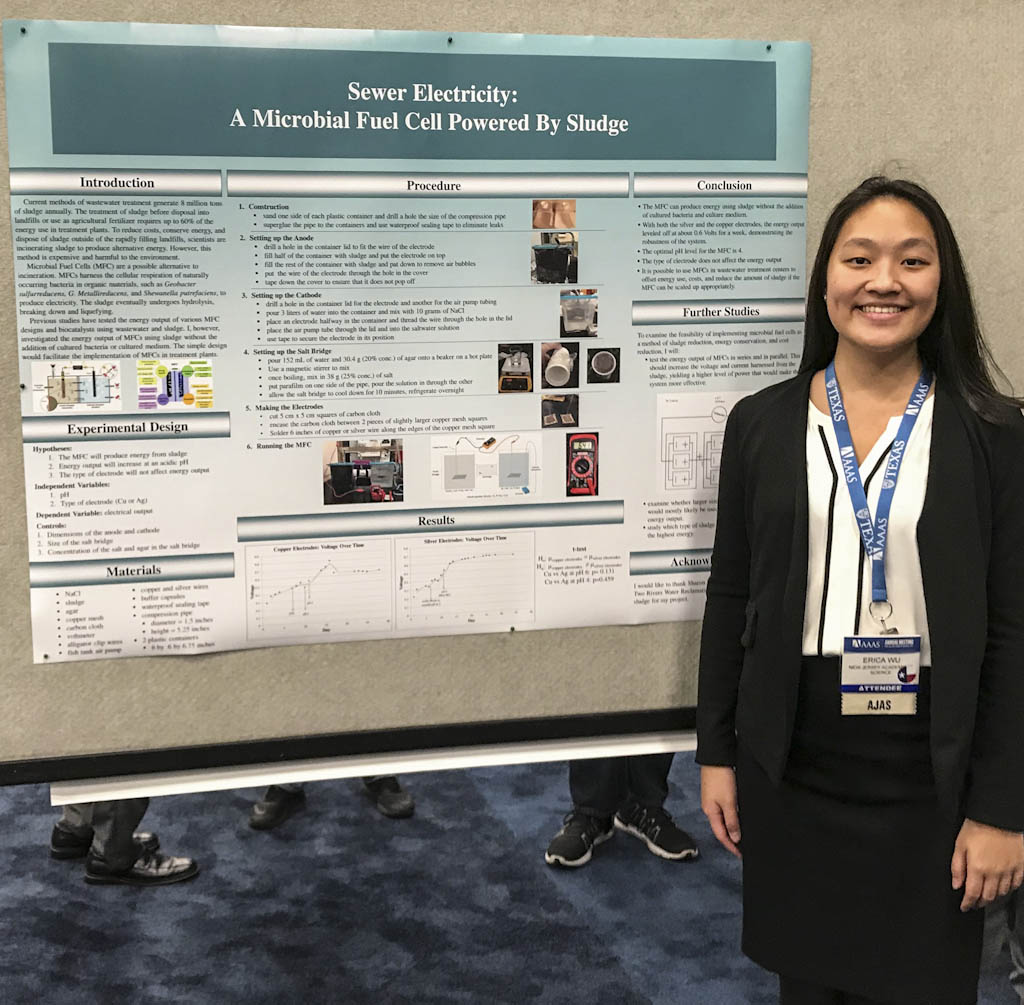HOLMDEL – Holmdel High School senior Erica Wu recently had the opportunity to present her research at the American Junior Academy of Science Conference in Austin, Texas.
Erica originally began her project in her junior year as part of her work in the high school’s Honors Advanced Research class. Her project, titled “Sewer Electricity: A Microbial Fuel Cell Powered by Sludge,” focused on generating electricity from sewage sludge, according to a prepared statement from Holmdel High School.
“I have always been interested in recycling and renewable energy, so I wanted to design a project for my Honors Advanced Research class that pertained to those fields. I came across an article online about a newly designed microbial fuel cell powered by urine, and I was intrigued by the concept,” Erica said. “I then decided to try building a microbial fuel cell powered by sludge instead. I chose this because sludge is a major by-product of the wastewater treatment system. Millions of tons of sludge are generated every year and it is expensive to dispose of the sludge.”
In addition to earning high marks for her research in the class, Erica presented her work at the New Jersey Academy of Science symposium at Kean University, where she won first place in the Environmental Science division. Her outstanding showing at the state event resulted in her invitation to be one of the New Jersey delegates to the AJAS conference in Austin, which took place Feb. 14-18.
“From my experiment, I concluded that sewer sludge, without the addition of cultured mediums and biocatalysts, can be used in the anode of a microbial fuel cell to produce energy,” she said. “I found that the optimal pH of the system was at four and that the energy output did not depend on the type of electrode metal – silver or copper in my experiment. Under these conditions, the energy output stabilized at about 0.6 volts.”
Erica said she obtained her sludge from the Two Rivers Water Reclamation Authority.
“I wanted to use sludge in a microbial fuel cell to produce alternative energy. This could be a cheaper and more environmentally-friendly option to reuse sludge and reduce the costs of disposing it, especially as some costs are recuperated in the form of electricity,” Erica said.
The AJAS is the only national honor society recognizing America’s premier high school students for outstanding scientific research. Each state’s Academy of Science nominates high school students as AJAS delegates. The chosen delegates are then invited to attend the AJAS annual conference. The AJAS mission is to introduce, encourage, and accelerate pre-college students into the professional world of science, technology, engineering and mathematics, according to a prepared statement.
Along with the presentation of her project, Erica toured the University of Texas facilities and had breakfast with scientists. She attended a lecture titled “The International Space Station: A Laboratory in Space” by Dr. Ellen Ochoa, a veteran astronaut and the 11th director of the Johnson Space Center, according to a prepared statement.
“I had a lot of fun presenting my project and sharing what I did with others. One teacher from Iowa commented that it seemed clear that I was ‘very passionate about my work’ and very ‘at ease’ and ‘bubbly,’ which interestingly is a comment I have heard a few times as I have presented at various events. She also mentioned that in her area, farmers fight over who gets the sludge from their water treatment plant to use as fertilizer, which I found fascinating,” Erica said.
According to Erica, two adults also asked to take pictures of her project poster, and one of them mentioned she would show it to her eighth-grade class, who would find it very interesting.
“I also presented to a 16-year-old student from the United Kingdom. He commented how envious he was at the many opportunities for high school scientists in America, whereas most opportunities are for university students in the United Kingdom. It was cool to hear about our science event from the perspective of a peer from another country. Overall, it was an enjoyable and enlightening experience,” Erica said.
She also heard from neurobiologist and geneticist Dr. Cori Bargmann, president of the Chan Zuckerberg Initiative, in her lecture, “The Chan Zuckerberg Initiative: Accelerating Science,” according to a prepared statement.
“I participated in the Designing for Mental Health, Texas Advanced Computing and Center for Electromechanics tours. They were all very interesting. I especially enjoyed learning about design thinking, which contrasts starkly with the way scientific projects are designed,” Erica said. “In creating a product or service for health applications, teams focus more on qualitative research and conversations with prospective consumers rather than quantitative knowledge about the issue at hand.”
Though humbled by the accolades her project has received, Erica admits she is especially proud she was even nominated, considering her project was almost entirely conducted within the confines of her school classroom as part of her Honors Advanced Research course, according to a prepared statement.
“The breakfast with scientists was also an amazing opportunity. I spoke to a neurobiologist about her work examining the intersection of mood disorders and addiction. I also spoke to a cancer biologist about her work and advice she would have for pursuing science as a career,” Erica said.
Erica said she most enjoyed meeting new people and hearing about their innovative projects.
“I also enjoyed the presentations on new advancements in science. I attended one seminar on innovations in neuroscience and learned about novel experiments where paralyzed individuals with an array of electrodes implanted into their brain can control a cursor on a screen to type a message,” Erica said.
Erica said she is waiting for decisions from a few colleges, but she has been admitted early action to Yale University, which is one of her top choices.
For more information, visit www.academiesofscience.org/ajas-about.
Contact Vashti Harris at [email protected].

